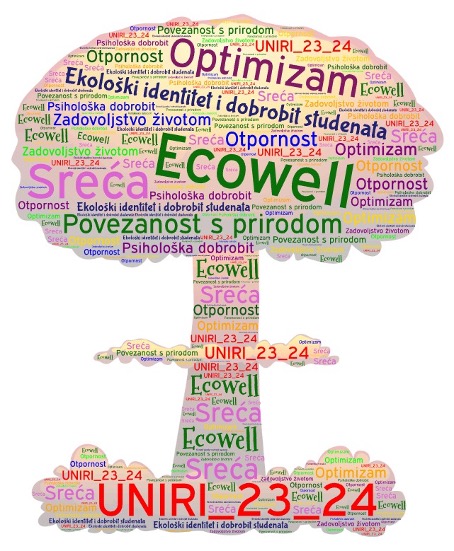Research
Area
Abstract
In a world facing numerous climatic changes, personal and social changes within societies become necessary and required at all levels, from politics, economics, education, to the nature and quality of daily life, and in accordance with the outlined SDG 2030. Questioning the relationship between environmental identity (EID) and quality of life, well-being, life satisfaction, happiness, personality traits and behaviour is a contemporary interdisciplinary research challenge. The aim of this research is to investigate the relationship between environmental identity, connectedness to nature, psychological well-being (operationalized well-being, optimism, life satisfaction and happiness), socio-demographic variables (gender, age, study), personality traits and ESD among students of the University of Rijeka in different courses of study. By conducting this research, the relationship between environmental identity, well-being and education of students at the University of Rijeka will be investigated. The total sample of students will be examined with questionnaires in a correlational design and the sub-sample of students will be examined with an experimental design to investigate the effect (of education and natural spaces) on the focal variables. A significant positive relationship is expected between EID and higher levels of all dimensions of student well-being in the overall sample, and a significant effect of education and natural spaces on the development of EID and greater CNS in the subsample. The research findings will contribute to new scientific knowledge about which factors are interrelated and whether education influences the development of EID and students’ well-being in meeting the challenges of SD. The resulting scientific findings can serve as guidelines for further strengthening students’ well-being in the context of creating conditions for the development of an EID, with the goal of developing eco- responsible and more sustainable citizens of society.
Project
Description
Environmental identity (such as “European”, national or ethical) represents a multi-layered construct, a combination of people’s cognitive, affective and physical relationship to nature, the way an individual defines themselves in relation to nature, how they perceive themselves as part of nature and how they incorporate it into their identity (Clayton, 2003, Optow & Clayton, ). It enables a (self-)understanding of one’s own relationship to nature, but is also a way of recognizing one’s own (and each other’s) relationships in the social, cultural, professional and other “world”. Numerous studies confirm the connection between environmental identity and group identity, psychological well-being (environmental management, self-acceptance, personal growth, meaning of life, positive relationships with others and autonomy), personality traits, optimism, happiness, values, empathy, life satisfaction, closeness to nature, pro-ecological behaviors, availability of natural spaces, urban and rural lifestyles, but also with upbringing and education (Payne, 2001, Hinds & Sparks, 2009, Kızılay & Önal, 2019, Irkhin, 2020, Andjić & Hadela, 2021, Sierra-Baron & al., 2023; Blanchard & Paquet, 2023, Clayton et al., 2023). Research also indicates that mental health, well-being, environmental identity and connectedness to nature are factors that can contribute significantly to coping, predicting and taking action to mitigate climate change and promote greater care and the necessary changes in individual and community behavior towards the environment (Sierra-Baron et al., 2023). In this study, in addition to the aspects mentioned above, psychological well-being is also investigated (Ryff & Singer, 2006), examining the following variables: optimism, life satisfaction and happiness as well as personality traits. The harmony of environmental identity, well-being and life satisfaction, optimism, happiness and behavior, and personality traits is the area of concern to understand both personal identity and society and the perception of one’s role in a society striving for a more sustainable future (Blanchard & Paquet, 2023, Sierra-Baron & al., 2023).


Project
Goal
The aim of the project is to determine the level of environmental identity of students and to investigate its relationship to socio-demographic variables, psychological well-being, optimism, life satisfaction and happiness as well as personality traits. Research questions: what is the relationship between students’ socio-demographic variables, environmental identity, connectedness to nature and well-being (optimism, etc.)? Is there an influence of education and natural spaces on students’ ecological identity and psychological well-being?

